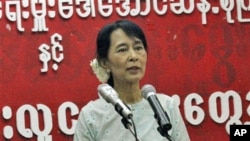"Societies flourish when they address human rights problems instead of suppressing them," said Secretary of State Hillary Clinton in her introduction to the 2010 Human Rights Report. "We hope that this report will give comfort to the activists, will shine a spotlight on the abuses, and convince those in government that there are other and better ways."
This year marks the 35th year of the Human Rights Report, which is mandated by the U.S. Congress. As in past years, the 2010 report raises grave concerns about human rights abuses in Burma.
Burma, a country of some 56 million people, is ruled by a highly authoritarian military regime that tolerates no opposition.
According to the 2010 report, the regime continued to curtail the right of citizens to change their government. The regime detained civic activists indefinitely and without charges, harassed and curtailed their activities, and imprisoned political activists on trumped-up criminal charges.
While in government custody, prisoners were held under life-threatening conditions, were held incommunicado, and denied sufficient medical care.
Government security forces were responsible for extrajudicial killings, custodial deaths, disappearances, rape, and torture. The army continued its attacks on ethnic minorities, causing deaths, forced relocation, and other serious abuses. The government routinely infringed on citizens' privacy and restricted freedom of speech, press, assembly, association, religion, and movement.
The government of Burma did not allow domestic human rights nongovernmental organizations to function independently, and imposed grave restrictions on international NGOs.
Violence and societal discrimination against women and ethnic minorities continued, as did recruitment of child soldiers and trafficking in persons. Workers' rights remained restricted; forced labor persisted. The government took no significant actions to prosecute or punish officials responsible for human rights abuses.
Yet 2010 saw some positive movement in Burma. Aung San Suu Kyi was released from house arrest and has thus far remained free, although the government continues to deny her democratic opposition party, the National League for Democracy, legal status.
It remains to be seen whether the appointed nominally "civilian" government, will ease its iron grip on Burma’s government and civil society. Ultimately the international community will judge Burma's government not on what it claims to call itself, but on what actions it takes to address core human rights concerns.
"Where human rights matter, children grow up with the precious belief that they matter, too; that they should be able to live in dignity and shape their own destinies," said Secretary Clinton. "People everywhere deserve no less."
Burma's Human Rights in 2010

Burma, a country of some 56 million people, is ruled by a highly authoritarian military regime that tolerates no opposition.



